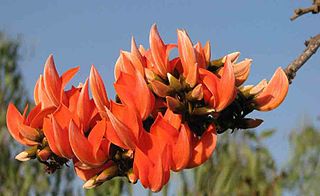
Butea is a genus of flowering plants belonging to the pea family, Fabaceae. It is sometimes considered to have only two species, B. monosperma and B. superba, or is expanded to include four or five species.

Libidibia monosperma is a species of legume in the family Fabaceae, with the common names cóbana negra and cóbana polisandro. It is found in the Dominican Republic, Puerto Rico, and the United States Virgin Islands. It is a federally listed threatened species of the United States.

Juniperus monosperma is a species of juniper native to western North America, in the United States in Arizona, New Mexico, southern Colorado, western Oklahoma (Panhandle), and western Texas, and in Mexico in the extreme north of Chihuahua. It grows at 970–2300 m altitude.

Juniperus pinchotii, commonly known as Pinchot juniper or redberry juniper, is a species of juniper native to south-western North America, in Mexico: Nuevo León and Coahuila, and in the United States: south-eastern New Mexico, central Texas, and western Oklahoma.
Beauprea congesta is a species of plant in the family Proteaceae. It is endemic to New Caledonia.
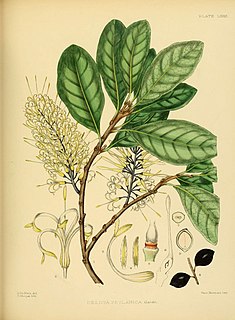
Helicia is a genus of 110 species of trees and shrubs, constituting part of the plant family Proteaceae. They grow naturally in rainforests throughout tropical South and Southeast Asia, including India, Sri Lanka, Indochina, Peninsular Malaysia to New Guinea and as far south as New South Wales.
Roupala loxensis is a species of plant in the family Proteaceae. It is endemic to Ecuador.
Roupala sphenophyllum is a species of plant in the family Proteaceae. It is endemic to Peru.
Stenocarpus dumbeensis was a species of plant in the family Proteaceae. It was endemic to New Caledonia.
Tarenna agumbensis is a species of plant in the family Rubiaceae. It is endemic to Karnataka in India.
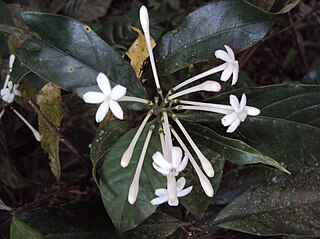
Tarenna is a genus of flowering plants in the family Rubiaceae. There are about 192 species distributed across the tropical world, from Africa, Asia, Australia to the Pacific Islands. They are shrubs or trees with oppositely arranged leaves and terminal arrays of whitish, greenish, or yellowish flowers.
Tarenna drummondii is a species of plant in the family Rubiaceae. It is found mainly in Kenya and Tanzania in East Africa.
Tarenna luhomeroensis is a species of plant in the family Rubiaceae. It is endemic to Tanzania.
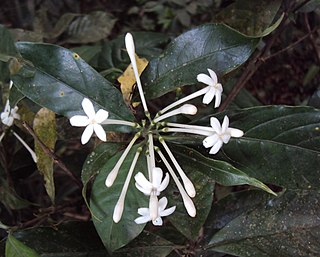
Tarenna nilagirica is a species of plant in the family Rubiaceae. It is native to Karnataka and Kerala in India.
Tarenna quadrangularis is a species of plant in the family Rubiaceae. It is endemic to Tanzania.
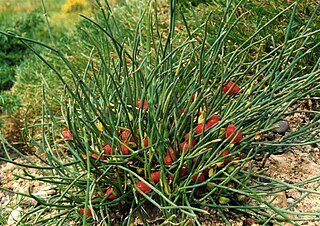
Ephedra monosperma, also called Ephedra minima or dan zi ma huang, is small shrub in the family of Ephedraceae.

Retama monosperma, the bridal broom or bridal veil broom, is a flowering bush species in the genus Retama, native to the western Mediterranean Basin.
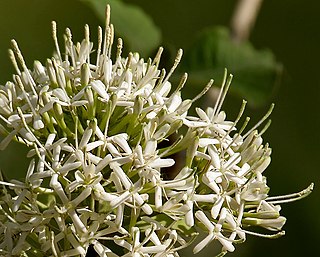
Pavetteae is a tribe of flowering plants in the family Rubiaceae and contains about 624 species in 9 genera. Its representatives are found from the tropics and subtropics of the Old World and the southern Pacific region.

Goniothalamus monospermus is a species of plant in the family Annonaceae. It is native to Fiji. Asa Gray, the American botanist who first formally described the species using the basionym Richella monosperma, named it after its fruit's solitary seed which have notable wing-like fringes.

Tarenna sechellensis is a species of plant in the family Rubiaceae. It is known from the Seychelles, Madagascar and Mayotte. The English botanist John Gilbert Baker was the first to formally describe this species in 1877, subsequently V. S. Summerhayes assigned the species to the genus Tarenna.












